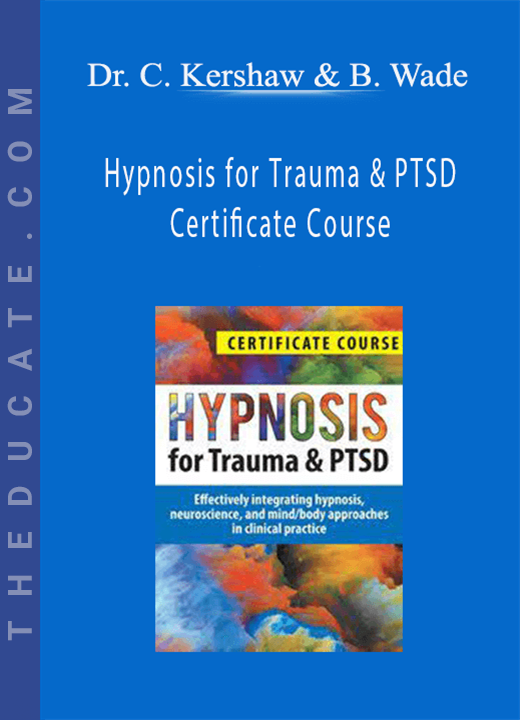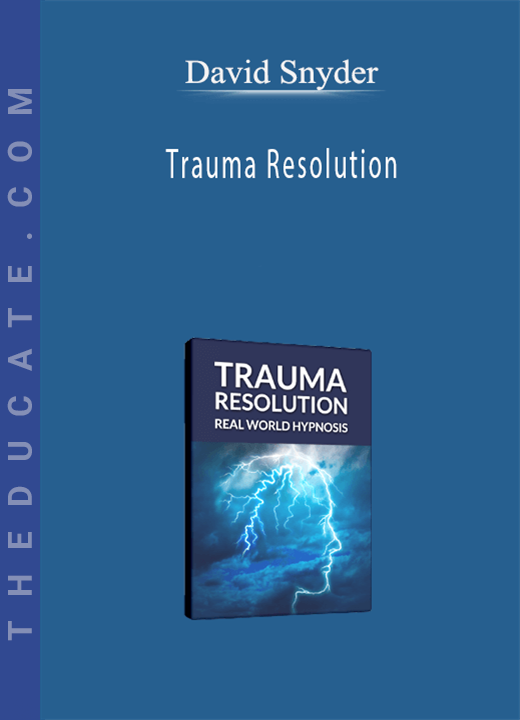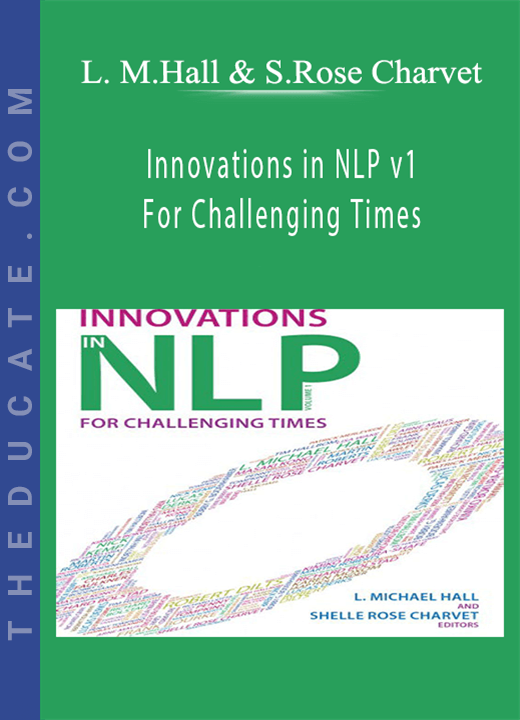Description
Dr. Carol Kershaw & Bill Wade – Hypnosis for Trauma & PTSD Certificate Course
Add additional power to your current clinical approach and make trauma treatment more effective in a shorter period of time when you incorporate clinical hypnosis in your practice.
Hypnosis is gentle, collaborative and powerful in eliciting lasting change in clients. Now you can join long-time Ericksonian-based practitioners, Drs. Carol Kershaw and Bill Wade, in this comprehensive certificate course where they draw on the resource-based approach of Ericksonian Tradition as well as modern brain science and neurology to provide you a step-by-step guide for applying hypnosis to your clinical practice.
Throughout the course, special emphasis will be given to understanding how trauma affects the brain and how hypnosis can be used to alleviate PTSD symptoms such as anxiety, depression, panic, insomnia, obsessive-compulsive behavior and difficulty handling anger.
Whether you’re new to hypnosis or an experienced hypnotherapist, this unique training opportunity can improve both your competence and confidence in resolving entrenched trauma using clinical hypnosis.
Enrollment at this deeply discounted price is extremely limited — lock in your spot today!
Join Drs. Carol Kershaw and Bill Wade for this unique video course where they will show you step by step how you can use hypnosis to bypass your client’s conscious limitations and enlist resources from the unconscious to help resolve trauma.
Through case examples, video clips, demonstrations, experiential exercises and hands-on experience, Kershaw and Wade will demystify and simplify hypnosis techniques so you can start using them with your clients immediately.
If you are new to hypnosis, you will gain the skills you need to start using practical hypnosis strategies in your practice.
And if you are an experienced hypnotherapist, you can add clarity, depth, and innovation to your work.
Here’s what you’ll learn to do in this certificate training…
Integrate the essential building blocks for safely and easily incorporating hypnosis into clinical practice.
Gain client buy-in by learning how to provide effective psychoeducation that includes the research and science behind hypnosis.
Alleviate symptoms of trauma and PTSD through focused attention.
Enhance your treatment planning by understanding the neuroscience of hypnosis.
Advance your clinical assessment skills by understanding how the critical differences among attachment categories impact your clients.
Improve clinical outcomes by learning to utilize evidence-based mind/body tools and strategies.
Boost trauma symptom resolution with three simple hypnotic strategies.
Calm your client’s anxiety, panic, and reactivity by learning how to induce deep hypnotic states.
Prevent your clients from getting stuck by learning to recognize and prevent trauma symptoms acting as negative trances.
Improve your clients’ level of functioning and emotional stability with three hypnotic protocols.
Help clients move forward in clinical treatment with therapeutic strategies for modifying attachment patterns.
You’ll also learn…
Neurophysiology of Trauma/PTSD
- Impact of trauma on the nervous system and brain
- Impact of stress on the brain
- Vagal Nerve Activation-Stephen Porges
Adverse Childhood Experiences (ACES)
- Intense and prolonged trauma
- Developmental trauma
- Seizure activity with trauma
Trauma and Attachment
- Attachment styles
- Trauma and dissociation style attachment
- Attachment and relationships
Latest Neuroscience Research on Body/Mind Healing
- Body/mind as frequency, light and innate healing abilities
- Discovery of filament structures in the body carrying information
- Cellular biophoton release
Long-Term Stress and Its Impact on the Limbic System
- Symptoms of limbic over arousal: Anxiety, startle response, panic, obsessive-compulsive patterns, anger, insomnia
- Symptoms of limbic under arousal: Depression, negative thinking and altered perception of experiences
Essentials of Clinical Hypnosis
- Definition of hypnosis as resource activator
- Focused attention and suggestion
- Hypnotic language
- Conversational hypnosis
- Psychotherapy as hypnosis
- EEG hypnosis
Putting Clinical Hypnosis to Practice
- Simple inductions
- Changing mental states
- Strategies to interrupt rumination
- Strategies for anxiety, depression, and calming the nervous system
- Experiential exercises to practice the skills learned
- Demonstration: EEG Hypnosis
Strategies for Developing Traumatic Memory Reconsolidation
- Retrieval and disruption
- How to move a memory from short-term to long-term
- State-dependent memory and learning
Focused Attention as a State of Negative or Positive Hypnotic Trance
- How optical system may play a role in symptom formation and removal
- Focus on “nothing” helps eliminates negative thought
Simple Biofeedback Tools Paired with Hypnosis to Support Post Traumatic Growth
- Heartmath HRV Training
- Temperature Training
- Breath Training and Meditation
- Galvanic Skin Response Training
How to Avoid Common Mistakes in Talk Therapy that May Make Trauma Symptoms Worse
- Too much attention to feelings
- Too much emphases on the trauma story
Enroll today and you’ll get these FOUR FREE BONUSES (A $108.84 value)!
Change Anything for Good (Digital Book)
We all have the capacity to change anything if we know how our brain works, we have an adequate plan of action (self-control and motivational strategies), and we set up our environment in such a way that it supports the change we want to make. Based on the neuroscience research on self-control, motivation, and procrastination, this digital book shows you how to use simple tools to activate brain circuits that lead to success in any endeavor.
Change Anything for Good (Companion Audio Download)
When conditions like anxiety and depression are experienced chronically, they condition neural pathways and shape a person’s perception of and response to life events. As these pathways are reinforced, unhealthy neural networks turn on with increasing ease leaving clients stuck in negative patterns. In this audio download, Dr. Carol Kershaw tells you how you can help create lasting change for your clients through the repatterning of neural pathways — so you can help your clients live in joy with the ability to self-motivate and accomplish life goals.
Hypnosis and the Brain (Audio Download)
Interventions based on the latest brain science discoveries are more effective in helping clients create lasting change. Based on their new book, Brain Change Therapy: Clinical Interventions for Self Transformation, this audio download features Drs. Carol Kershaw and Bill Wade describing how to help clients move from stuck states of mind (where they are in life) to their desired outcome (where they want to be) by changing and conditioning mental states that lead to their target goals.
Q&A Call Recording
Register today and access an exclusive Q&A call recording where Drs. Carol Kershaw and Bill Wade address questions directly from course attendees and share additional insight into using clinical hypnosis.
Who is this training for?
This course has been carefully designed for therapists, coaches, educators, caregivers, health professionals and anyone in a helping profession interested in adding additional power to their current clinical approach.
Continuing Education Credits Available!
Click here for total course CE Credit and details specific to your profession.
Want to know more about the course outline?
Click here for course objectives and outline.
Certificate of Completion
In recognition of completing this training, participants will be awarded a certificate of completion.
Your certificate not only showcases your personal and professional accomplishment, it shows your clients, your colleagues, and employer your continued dedication to furthering your education and improving therapeutic outcomes.
About the course faculty:
Dr. Carol Kershaw, Ed.D., has been licensed as a clinical psychologist for over 35 years.
She serves as co-director of the Milton Erickson Institute of Houston and is Board Certified in Biofeedback by the Biofeedback Certification International Alliance. She is the co-author of Brain Change Therapy: Clinical Interventions for Self-Transformation and The Worry Free Mind: Train Your Brain, Calm The Stress Spin Cycle, and Discover a Happier, More Productive You.
Dr. Kershaw maintains a private practice working with clients suffering from trauma, anxiety, stress, and depression. She has been featured on numerous media outlets including ABC, CBS, Fox and NBC regarding her work.
Speaker Disclosure: Financial: Carol Kershaw receives royalties as an author for W.W. Norton and Company. She receives a speaking honorarium from PESI, Inc. Non-financial: Carol Kershaw has no relevant non-financial relationship to disclose.
Bill Wade, Ph.D., LPC, LMFT, is a licensed professional counselor and marriage and family therapist, author, and international trainer. He serves as co-director of the Milton Erickson Institute of Houston and is also a co-author of Brain Change Therapy: Clinical Interventions for Self-Transformation and The Worry Free Mind: Train Your Brain, Calm The Stress Spin Cycle, and Discover a Happier, More Productive You.
Dr. Wade is a clinical member and approved supervisor with the American Association for Marriage and Family Therapy and is a member and approved consultant with the American Society of Clinical Hypnosis. He is an international trainer and has taught extensively on neuroscience approaches to change. He has also taught meditation and given Dharma lectures at various Buddhist temples.
Speaker Disclosure: Financial: J. William Wade maintains a private practice. He receives royalties from W.W. Norton, Amazon Books, and CDS. He receives a speaking honorarium from PESI, Inc. Non-financial: J. William Wade is a member of the American Association for Marriage and Family Therapy; American Counseling Association; and Texas Association for Marriage and Family Therapy.
Learning that Fits YOUR Schedule:
Watch your email for your order confirmation, and get instant access to your learning portal for the comprehensive training. Review all the course materials at your own pace and at your convenience! Click here for course objectives and outline.
Access all course videos and materials online forever. Plus, use the CE21 Mobile™ app to access the course content on-the-go, wherever and whenever you want on your mobile devices.
Instantly collaborate with other professionals on the course materials through interactive message boards. You’ll be part of a community of hundreds of practitioners all focused on integrating clinical hypnosis in practice, providing valuable opportunities to share insight and experiences and to build your professional network.
Complete your online CE tests and earn up to 12.5 CE Hours! Click here for total course CE Credit.
100% Satisfaction Guarantee
Register for this comprehensive training course without risk. If you’re not completely satisfied, give us a call at 800-844-8260. We’re that confident that you’ll find this learning experience to be all that’s promised and more than you expected.







7 reviews for Dr. Carol Kershaw & Bill Wade – Hypnosis for Trauma & PTSD Certificate Course
There are no reviews yet.